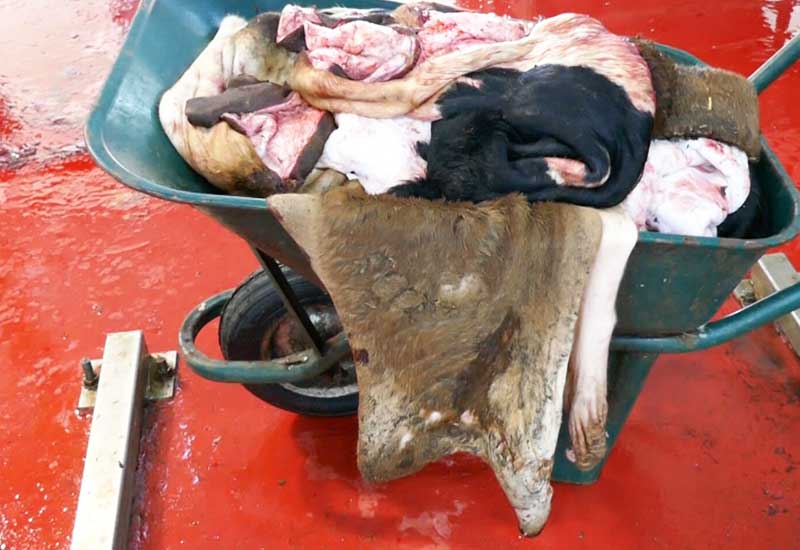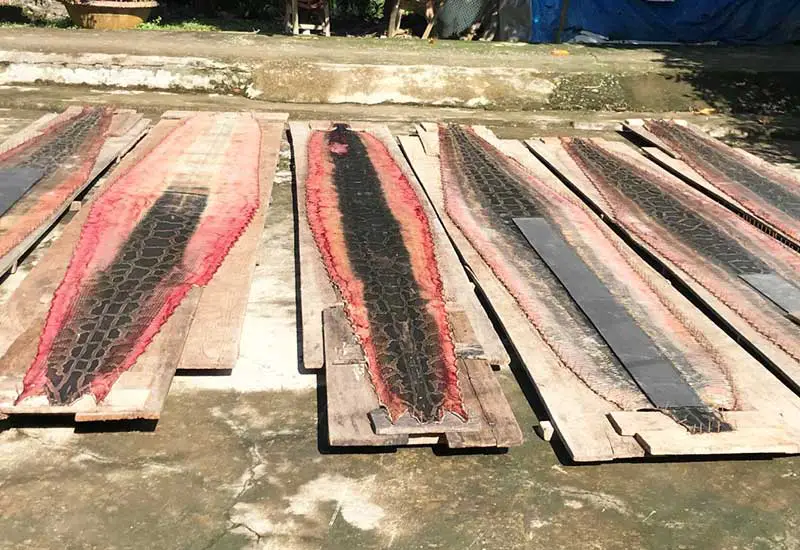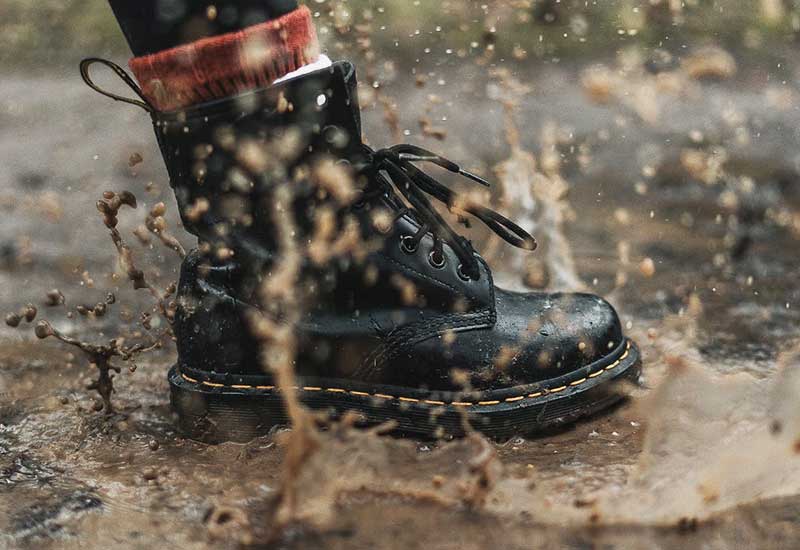You want to know why vegans don't wear leather? Then you've come to the right place! The catwalks and shop windows of this world are full of leather goods. Leather jackets, leather belts - or pants, coats, gloves and handbags made of genuine leather. Even leashes for dogs and saddles for horses are often made from the skin of cows and other animals. But what's so bad about that? Isn't leather a co-product of factory farming anyway, one way or another?
In this article I would like to show you why vegans do without leather and what exactly is so questionable about the material. Let's go!
Beforehand you will find here as always a short Table of contents about the article:
- Leather is more than "just" a waste product of the meat industry
- The animals suffer the usual fate of factory farming
- Not only cows have to suffer for genuine leather
- The tanning process is extremely harmful to the environment
- Uncertainty about the origin of the material
- People also have to suffer in production
- Vegetable tanning is not suitable for mass production
- Wearing leather suggests acceptance of animal exploitation
- Leather is not a vital material for us humans
- There are countless vegan leather alternatives
Let's not misunderstand each other: Of course, there are vegans who continue to wear their old leather clothes until they break. But buying new clothes made from real leather would be an inconsistent, non-vegan act. Fortunately, vegan leather is also available, so nobody has to do without anything 😉.
1. because leather is more than "just" a waste product of the meat industry

Leather is often made from the hide of cattle raised primarily for their meat and milk. It is therefore mostly a byproduct of the meat industry, which is why many people consider it a sustainable and ethical material.
But on the one hand it is a animal exploitative system, in which cows, for example, are artificially impregnated under painful dehorning. A system that you help finance by buying leather goods. And on the other hand many animals also killed exclusively for thisto process their skin into high-yield leather. Either way, there is no real handbag or jacket made of real leather without the death of an animal - and that's exactly why vegans simply do without leather.
2. because the animals the usual fate of factory farming blooms
Cows are kept in the Factory Farming first exploited for their meat and milk and then killed. Their skin is then processed into leather. Among them fall also male calvesThey are not economical for the industry and are therefore processed into calfskin shortly after birth. The female calves are threatened with the fate of their mothers as milk cows, before they are then also killed.
3. because not only cows suffer for genuine leather need

For leather alone, for example, about 1.4 billion Cows, water buffalo, sheep, goats, kangaroos and pigs tortured and killed.₁ The situation is similar for exotic animals, such as Snakes, alligators or armadillos, which are usually even kept and killed exclusively for their skin.
There was a huge outcry in the USA when leather goods from China were declared and exported as cowhide, but in reality it was the skin of Dogs acted₂ But if you are honest: where is the difference between cow and dog skin? Although cows feel pleasure and pain just as dogs and cats do, no one seems to mind. This moral differentiation is called Speciesism.
So: why don't we just do something for the protection of both animals? Vegans are consistent in that respect and value the lives of all animals, which is why they accordingly do not wear leather.
4. because the tanning process is extremely harmful to the environment is
The Global Fashion Agenda, the leading international forum for sustainability in fashion, has determined that Leather the least sustainable material for clothing. Even synthetic leather is about half as polluting as genuine leather.₃
It is above all the enormous consumption natural resourceswhich makes the leather industry also from an ecological point of view highly questionable. Last but not least, poison the Waste water from the tannery with chromium, hair, salts, sulfides, acids and arsenic surrounding waters.
It would be truly sustainable if the animals' skin could degrade naturally. But if ethics and sustainability were really that important to us, we would not breed the animals for meat, milk and leather in the first place. This is another reason why vegans do not wear leather.
5. because Uncertainty about the origin prevails
If "Made in Germany" or "Made in Italy" can be seen on the labels of leather goods, this is no guarantee that the leather may have been produced in the most environmentally friendly way possible.₄ The material itself can also come from countries that discharge their wastewater into the environment with impunity and are also responsible for cruelty to animals do not have to fear any serious consequences. What I want to say: Companies do not have to declare where their leather material comes from - and therefore, as a consumer, you rarely know how sustainable a particular leather product actually is. The only thing you know for sure is that animals had to suffer and die for it.
6. because in the production also people have to suffer
Why vegans don't wear leather? Also out of respect for the people who have to work in the leather industry. In countries like Bangladesh or India there are hardly any health regulations for the production. Children stand there in the tannery barefoot in toxic chemicals like arsenic and chromiumso that the leather obtained can later be sold to companies in Germany or the USA.₅ Studies have confirmed that these conditions are Lung diseases and skin diseases cause.₆
However, not only in developing and newly industrializing countries, but also in Western countries have already been higher cancer rates found in tannery workers. For example, in Italy, Great Britain and Sweden.₇
Due to the fact that the often anyway already contaminated waters are additionally burdened by the industry's toxins, the health risk from leather production for all people - even away from the tanneries - also continues to rise.
Tip: A vegan lifestyle serves not only the animals. You can just as well vegan for people be. In the linked article you can learn how this can help others.
7. because vegetable tanning is not suitable for mass production
In fact, animal skin can be made to last longer without chemicals using vegetable substances (such as bark or oak wood). But vegetable tanning is a Extremely time-consuming processfor which large quantities of natural raw materials are also required.
Most trees only form the bitter substances they need after 30 years of growth. The industry does not have this time - and if it does, the leather products produced are incredibly expensive. The leather products from vegetable tanning are therefore not suitable for the masses.₈
8. because the wearing of leather the acceptance of animal exploitation suggests

The longer people wear a watch with a leather strap or a leather jacket, put a leather armchair in their living room or strut around with a handbag made of crocodile leather, the longer the material is accepted in our society. Vegans also don't wear leather because they have a social rethinking effect and bring people to the Questioning the necessity, origin and background of leather goods would like to stimulate.
Tip: The same applies, for example, to wearing jackets with fur hoods. Even if it is only faux fur, just wearing the jacket increases the acceptance of animal components of garments, as it is Difficult to distinguish real fur from artificial fur let. If you want to know more about the Background of the fur industry If you would like to know more about the new product, please have a look at the linked article.
9. because realLeather not a vital material for us humans is
Maybe there was a Time in human developmentin which animal skins helped us to survive. But those days are long gone. There is simply No longer an ethical and justifiable necessity for exploiting innocent animals to make clothes and everyday items out of their skin. This is a very decisive motive for many vegans to simply keep their hands off animal products.
Tip: I've also put together another detailed article for you about it, why i live vegan at all. Look gladly times purely!
10. because there are countless vegan leather alternatives gives
Whether Apple, cactus, cork, eucalyptus or pineapple - vegan leather can be made from all these vegetable materials, which you can distinguish from conventional animal leather only by looking closely.
So, apart from the fact that we use leather only for aesthetic or habitual reasons - that is, for reasons that are not necessary for life - we can also Switch to animal-friendly, sustainable alternatives, if we still do not want to do without leather goods.
What is genuine leather?
Genuine leather is a material often used for clothing or furniture, which is obtained from the skin of animals.
Are animals killed for leather?
There is no leather without the death of an animal. Leather is often a by-product of the meat industry and is mainly made from cow skins - but animals such as snakes or crocodiles are often captured, kept and killed solely for the purpose of making leather goods from their skin.
What is leather used for?
Leather is used, for example, to make clothing such as jackets, gloves, shoes or belts. However, the tanned skin of animals is also used in the production of bags, furniture, cars or riding saddles.
Is leather manufacturing animal cruelty?
There is no leather without cruelty to animals and the death of an animal. The material is considered the most profitable by-product of the meat industry. However, many animals are also mistreated and killed exclusively for this purpose, so that one can sell their skin afterwards profitably.
Is the consumption of leather products justifiable?
Whether the consumption of leather products is justifiable is of course a question of personal, moral values. But whether as a by-product of the meat industry or as the main product of the leather industry - skinning animals for non-essential reasons and thus polluting the environment would probably be considered unethical and rather unjustifiable by most people.
Vegans do not wear leather goods mainly for ethical and ecological motives
Now you've learned a little more about the ethical and environmental reasons vegans avoid leather goods. It is mainly the respect for animals, the environment and other people that motivates them to do so.
I hope very much that I could bring you with this contribution some light into the darkness. Because what we do to the animals, just to make a handbag out of them, goes on no cow skin. Not least because there are countless animal-free alternatives. How exactly you Distinguish genuine leather and imitation leather I will explain how you can do this in a separate article.
Do you have questions or suggestions about the leather renunciation of vegan living people? Then, as always, feel free to write me a comment.
Be always kind to animals,

PS: Feel free to look around the blog some more. You know for example, Why vegans do not wear wool? In the linked article you will now find out exactly!
References:
₁ PETA UK: Investigation Exposes Gruelling, Shocking Abuse in Global Leather Trade, available at https://www.peta.org.uk/features/global-leather-trade. [02.09.2021].
₂ A. Weissmann: Is your leather from China? It might be made of dog or cat skin (as of July 31, 2016), available at https://www.theguardian.com/business/2016/jul/31/dog-cat-leather-china-us-congress-trade-peta. [02.09.2021].
₃ Global Fashion Agenda (2017): PULSE OF THE FASHION INDUSTRY, available at https://www.globalfashionagenda.com/publications-and-policy/pulse-of-the-industry. [02.09.2021].
₄,₅ Earthlink Ed: Animals in the fashion industry: everything you need to know in 12 minutes, YouTube, 03/26/2021, web, 09/02/2021 at 09:32, in: https://www.youtube.com/watch?v=RE2mhaoUNaE.
₆,₇ S. K. Rastogi, C. Kesavachandran, F. Mahdi, A. Pandey (2007): Occupational cancers in leather tanning industries: A short review, available at https://pubmed.ncbi.nlm.nih.gov/21957364 [02.09.2021].
₈ AVESU GmbH: Why no leather, why Avesu?, available at https://www.avesu.de/infocenter/leder-und-gerbung.html. [02.09.2021].





Again, a page where much suffering is lamented and not a single helpful link to the vaunted alternatives. But expect people to change. Complaining and not showing how things can be better or not pointing to more advanced pages. That makes this one of those "do-gooder" theories that just complain and do nothing. 5 minutes waste of time.
And by the way, killing animals ONLY for their skin is prohibited in Germany and makes no economic sense.
Hello Malwina, thank you for your comment. With apple, cactus, cork, eucalyptus or pineapple some alternatives were mentioned. But it is even better to do without any leather at all, because otherwise you keep the social acceptance for wearing leather high.
And on the second aspect: In Germany, this may be prohibited, but the label "Made in Germany" always refers to the place where the leather is processed. German companies that import animal skin from Asia and process it here, for example, are allowed to use the label. Moreover, the local ban is of no use if consumers buy leather goods that have been processed abroad.
So, as you can see, not only is there suffering being lamented here, but something is being done about it.
I hope I was able to help you and I look forward to your reply.
Many greetings
Christoph